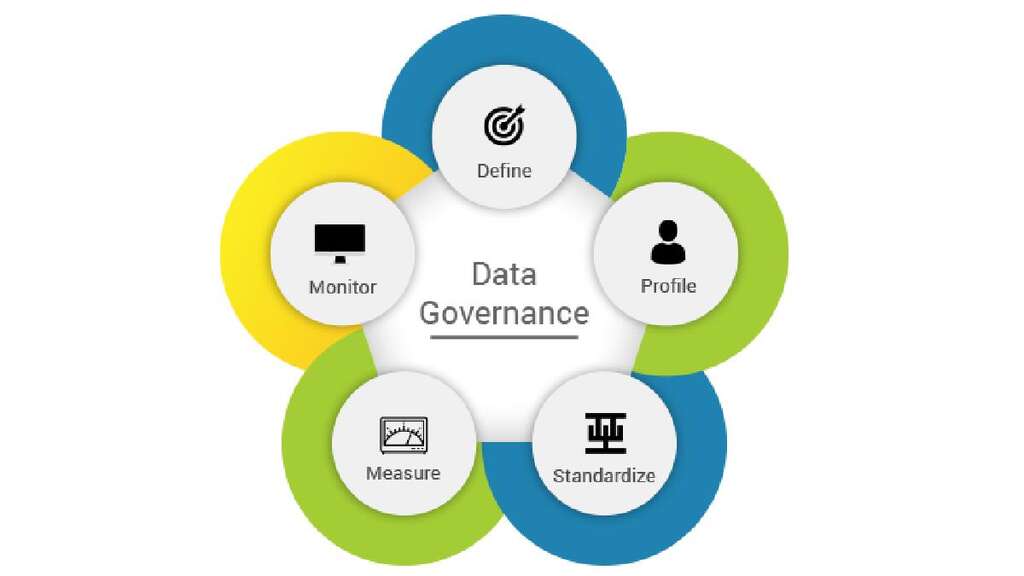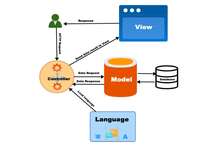The increase in the need to adequately structure and organize the information generated in companies has encouraged the application of Data Governance for productive and commercial management of the business.
For this reason, according to Webinarcare, companies that have Data Governance management manage to improve data analysis time by 2%, registering a 31% increase in confidence in the quality of the information obtained.
Currently, we find ourselves in a “ data society ”, made up of services that support it, such as Cloud Computing, artificial intelligence, and Big Data.
Learn a little more about these technological methodologies that support the growing culture of intelligent Data Governance in companies.

What is Data Governance?
For Google Cloud, Data Governance is a process focused on the rigorous management of information throughout its useful life cycle for the custom software development company, starting from its creation or origin to the application of the analysis results obtained.
Hence, data governance uses the availability, integrity, usability, and security of information to generate the necessary insight into the company’s decision-making.
Its main objective is to increase business productivity, reduce the use of resources, and maximize the security of stored data.
All productive areas can be covered in aspects such as:
- Internal company policies and procedures.
- Production, distribution, and marketing processes.
- Management of human talent and collaborators.
- Use of technological resources involved in the management of business processes.
In short, data governance allows you to execute correct decision-making by providing you with more accurate analysis and results of your company’s situation based on the information obtained from the business.
Data governance components
The framework under which Data Governance actions are developed is made up of the policies, rules, processes, business areas and technology implemented in the company.
For TechTarget , this framework must detail aspects such as:
- Mission, objectives, and metrics.
- Responsible for decision-making and accountability.
- Detailed documentation of each process and role.
In the case of technology, tools such as Robotic Process Automation are not a mandatory part of management, but they allow for streamlining the workflow, as well as collaboration and compliance with company policies.
These software are also used to create data catalogs (file and record structure) and other functions that promote governance in the company.
Importance of data governance.
As Data Governance is a system for making business decisions based on the analysis of processes related to information, each individual or group involved in the process becomes responsible for the company’s most precious asset: the data.
These figures reflect the confidence that data governance offers within an organization by providing effective solutions in the management of information in aspects such as sales projections and forecasts, business opportunities, improvements in production processes, etc.,
The alignment of information with business policies under an environment of stability and security has generated this adequate environment to obtain more competitive results.
Therefore, among the notable advantages obtained by implementing this data governance, the following stand out:
- Increase in business operational efficiency. Improves production, as well as monitoring processes effectively so that they meet objectives and mitigate errors.
- Reduction in costs. By having more assertive activities with less use of resources, the operational costs of the business are reduced.
- Increased profitability. Productivity is increased, reducing costs, and allowing for more efficient and economical products and services in greater volume.
- Reduction of risks. When you manage data in a controlled and protected environment under processes validated by data governance, you provide reliable final results.
- Optimizing data security. The use of technological tools for the digital transformation of the business through solutions such as Cloud Computing and all associated services helps you shield both On-premise and Cloud operations.
- Making more precise and correct decisions. Good information governance will always lead to the best results and benefits for software development services and other companies.
Data Governance Principles
To achieve the benefits described above, PowerData mentions that certain parameters must be followed that will allow you to solve data-related problems efficiently.
Among these principles, we can mention the following:
- Integrity: All participants in data governance must be communicative and truthful in information-related processes.
- Transparency: From entering the data in each process, until obtaining the results, it must be done clearly and without manipulation that alters the integrity or content.
- Auditability: Data Governance must offer better control of audit processes since it has adequate documentation that supports verification requirements.
- Responsibility: Clearly define the tasks and those responsible for making decisions.
- Control and Balance: The incorporation of technology in the business must be in correct accordance with the management of standards and requirements in the collection of information.
- Standardization: Clear and unique processes must be created that support the data, without generating doubts or operational dualities.
- Change management: Data Governance should enable proactive and reactive activities to reference data values, master data, and metadata.
In summary
The need for companies to effectively regulate the information generated through their operations has allowed Data Governance to cover business sectors with great impact such as banking, finance, and commerce.
These data management projects target all companies regardless of their size, providing continuous improvement of their operations thanks to the establishment of consolidated guidelines with business objectives and appropriate technology.
We know that it is not a process that takes time to carry out, but it can be achieved more easily if changes are applied in the processing of information associated with this culture of data governance.






